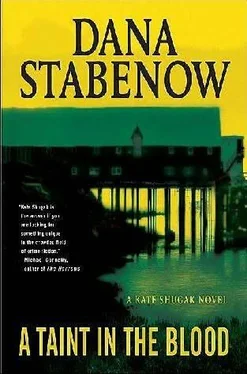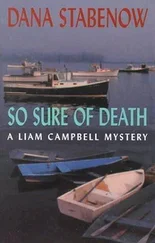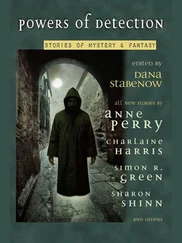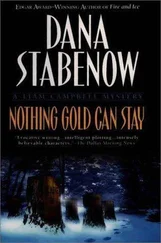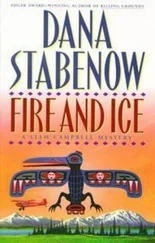Kate managed to restrain a shudder. “Where is Lew?”
“In D.C., doing some lobbying for UCo.”
Axenia put the baby down for a nap and served Kate coffee and Oreos on the beveled-glass table in the kitchen. “You look good, Axenia,” Kate said.
Axenia, less defensive and more self-assured than Kate had ever seen her, inclined her head in acknowledgment. Her hair was styled in the latest do and her clothes were the latest in casual chic, no doubt fresh off the rack at Nordstrom, and this would be Nordstrom in Seattle, where Axenia would fly to do her shopping, probably half a dozen times a year. “You look well, too,” she said. “Have you been in town for long?”
“A few days. I’m working on a case.”
“Really? What kind?”
“A murder,” Kate said, “thirty-one years ago.”
Axenia raised an eyebrow. “Didn’t they catch him?”
“Her,” Kate said, “they caught her, and she’s in jail, but there seem to be some unanswered questions. I was wondering if you knew anybody in the Muravieff family. They’re sort of connected to this case.”
“Of course,” Axenia said, “Nadine and I are good friends.”
“Nadine.” Kate passed in review a mental flip chart of what she knew of the Muravieff family tree. “Would that be Celia’s daughter?”
“Yes.”
Celia was Eugene’s sister. Nadine was Eugene’s niece. “Could you ask Nadine to introduce me to her mother?”
Axenia didn’t ask why; she just reached for the phone and dialed a number from memory. The call took less than two minutes. She hung up and said to Kate, “Celia lives with Nadine. You can go over there right now.”
“Thanks, Axenia.”
Axenia inclined her head again. “No problem.”
“You’ve got a cute baby there,” Kate said on the doorstep.
“Thank you,” Axenia said, and closed the door.
Kate stared at it for a few moments.
Nope, nothing in the way of a reconciliation going on there anytime soon.
Eugene’s niece Nadine lived west of Axenia, in Roger’s Park. Nadine’s house wasn’t as large as Axenia’s and it looked a lot more user-friendly, but then Kate told herself not to be so judgmental. Axenia had been well on her way to being a drunk in the Park. In Anchorage, she was sober and a mother and one hell of a housekeeper. Kate told herself she really had to learn how to let go.
“Kate Shugak?”
Her reverie interrupted, she looked up to see a short, slight woman regarding her.
“Yes,” Kate said.
“Ekaterina’s granddaughter?”
Kate stifled a sigh and nodded, wondering where her own identity had gone.
The woman had a compact, neat-featured face, well-proportioned, a face whose chief characteristic was its calm, a face it was hard to imagine angry, which would make it all that more formidable when it was. Her eyes were dark and direct and her hair a styled gray cap. She wore dark blue slacks and a white long-sleeved button-down shirt, tucked under a slim brown leather belt that exactly matched her penny loafers.
In the Park, Kate would have addressed Celia as “Auntie,” an honorific demonstrating the respect due an elder from a younger person. The word did not rise to her lips this afternoon. Maybe it was the fact that Celia was wearing her shoes inside, not the general practice in Alaska, as it tracked in snow and mud. Whatever the reason, Kate found herself saying formally, “Thank you for speaking with me this afternoon, Ms. – ”
“It’s Herrick, and it’s Mrs.” She indicated a chair. Kate sat. Celia sat opposite her and folded her hands. A younger woman came bustling in with a tray with coffee and a plate of homemade cookies. At least it wasn’t Oreos again.
“My daughter, Nadine,” Celia said. “Kate Shugak.”
Nadine filled the cups and made as if to sit next to Celia. Some signal passed between them that Kate did not see. Nadine stood back up as if she’d been attached to a wire that Celia was pulling, and said brightly, “Those kids sound like they’re killing each other. I’d better check on them.” She bustled out again.
Celia poured coffee. “I was sorry to hear about your grandmother. She was a strong woman, a strong leader, and very wise.” Celia allowed herself a small smile. “It doesn’t always happen that the two are able to coexist in one personality.” Her diction was smooth and uninflected, with no trace of ancestral gutturals. Celia was old enough to have been sent away to school, to Mount Edgecumbe in Sitka or even as far away as Chemawa in Oregon, where in that day and time she would have been punished severely for speaking in her Native tongue.
Of course, the Muravieffs had been members of the first tribes to be impacted by the intrusion of Western civilization, as witness their Russian-derived last name. They’d had a couple of centuries to learn how to speak English. “Thank you,” Kate said, accepting the coffee. She sipped it, scalding her tongue. “Your own family has produced some fine leaders itself. Harold Muravieff was one of the founding members of the Alaska Native Brotherhood, was he not?” She, too, could be formal when there was need.
Celia inclined her head, accepting the implied tribute as her family’s due.
Kate took a chance. “And I believe I remember my grandmother speaking of Mary Muravieff, your mother, who worked with her on the language of the Alaska Native Claims Setdement Act.”
Celia inclined her head again. Emaa and Mary had hated each other with a fervor that had passed into legend long before either woman was dead. Kate had never known the source of that hatred. When she was younger, she had tried to find out, but when she got older, she had come to realize that some things were better left to die a natural death. She still wondered, though, and it had been a risk mentioning Mary to Celia. Still, Mary had been a well-known Alaska Native leader in her own right, and deserved mention. She also provided a neat segue into Kate’s next comment. “Eugene was her son, I believe.”
Celia’s expression didn’t change. “He was.”
“And your brother.”
“Yes.”
“Ah.” Both women sipped coffee. “I wonder,” Kate said, displaying as humble a facade as she could manufacture, “I wonder, Mrs. Herrick, if you would mind talking to me about your brother, Eugene.”
“What do you want to know about him?” Celia said, still calm.
“I have been employed to look into the matter of his wife’s criminal case.”
Celia’s composed face displayed nothing but polite interest. “Indeed. By whom, may I ask?”
“Her daughter.”
“Charlotte?”
“Yes, Charlotte.”
Celia reached for the newspaper that was sitting on the table next to the serving tray. “Didn’t I read that Charlotte had been killed by a hit-and-run driver?”
“You did, yes,” Kate said.
“And you are continuing to look into this matter?”
“Yes. Charlotte was concerned that her mother had been wrongly imprisoned.”
“I see.” Celia put down her cup and gave Kate a kind and carefully limited smile. “I haven’t seen my brother in thirty years. I don’t know what I could tell you about him.”
“Were you at Victoria’s trial?”
Celia shook her head. “I’m afraid not.”
“He did not testify at her trial.”
“He was not called.”
“Did he tell you if he thought Victoria had set that fire?”
“On the contrary. He was sure that she had not.”
“Did he, perhaps, have any thoughts as to who might have?”
“No.” Celia rose to her feet. “I’m sorry to cut this so short, but I have an engagement this evening. Was there anything else?”
“Do you know where I might find your brother, Mrs. Herrick?”
Celia looked Kate right in the eye and lied like the trooper she was. “No,” she said. “As I said before, I haven’t seen Eugene in over thirty years.”
Читать дальше
